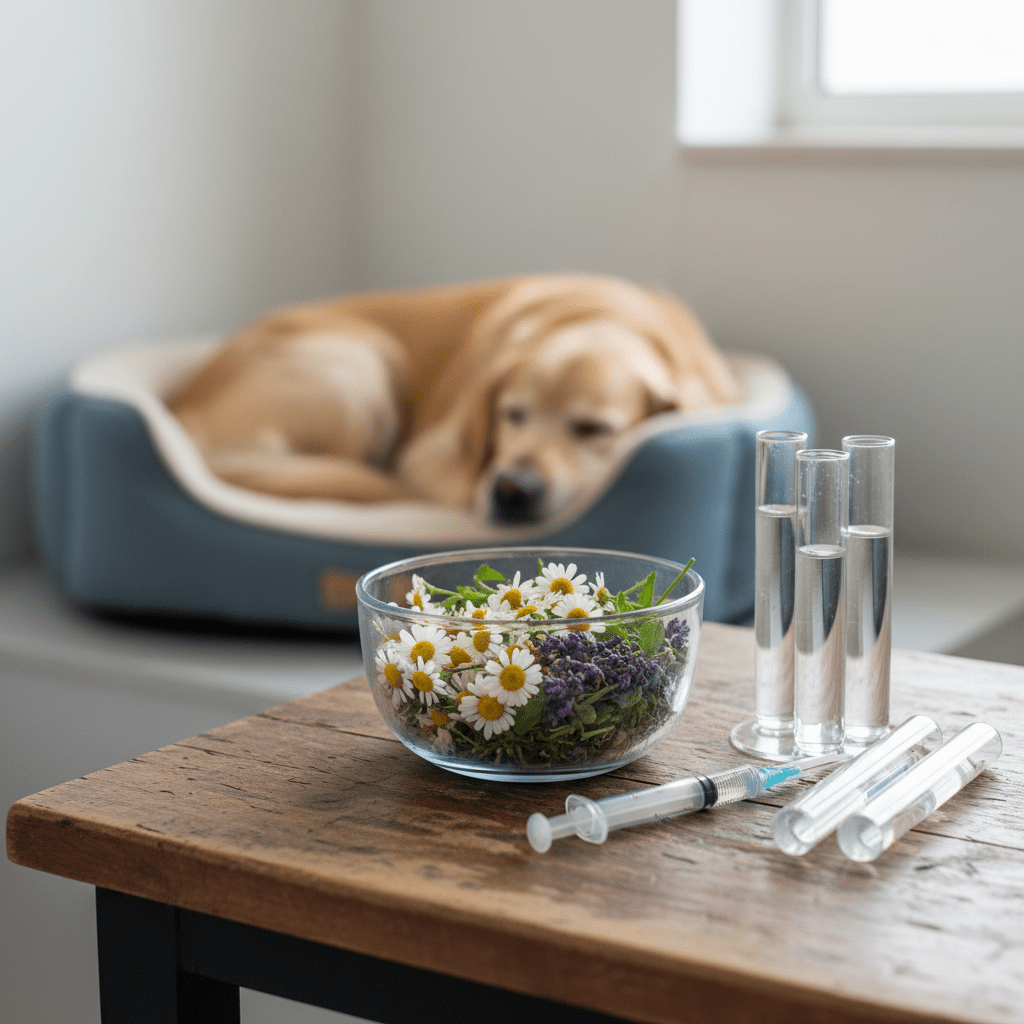Key Takeaways
- Malocclusion occurs when a dog's teeth do not align properly when their mouth closes.
- It is similar to a misaligned bite where some teeth may stick out or crowd together.
- Common types of malocclusion include overbite, underbite, and crossbite.
- An overbite is when the upper teeth extend too far forward.
- An underbite happens when the lower jaw protrudes, and a crossbite is characterized by teeth angling sideways.
Table of Contents
- What Does "Dog L" Mean?
- Leptospirosis & the "L" Vaccine: What Pet Parents Need to Know
- Dog Lab Work: What You're Really Getting
- Holistic Support for "Dog L" Health Challenges
- Dog Lab Work: What You're Really Getting (and Why It Matters)
- Leptospirosis: Spotting Signs, Acting Early, Supporting Natural Recovery
- Dog Malocclusion: Teeth, Bite, and Wellbeing
- Holistic Home Care: Nature-Loving Remedies for Dog L Health Challenges
- Community Wellness & Next Steps: Nurture with Nature, Every Day
What Does "Dog L" Mean?
When you see "L" on your dog's veterinary paperwork, it typically refers to Leptospirosis vaccination or lab work (blood panels). Understanding these "L" terms helps you make informed decisions about your pet's wellness journey.
The most common "dog l" references include Leptospirosis vaccines (often marked as L2 or L4), laboratory blood panels, and occasionally dental malocclusion notes. Leptospirosis is a bacterial infection that affects kidneys and liver, while lab work monitors your dog's overall health through blood markers.
Real scenarios where you'll encounter "L": Gary's senior Lab needs quarterly blood panels to monitor kidney function, while Wendy's active retriever gets annual L4 vaccines for outdoor protection. These aren't just veterinary checkboxes, they're proactive steps toward longer, healthier lives. For ongoing immune wellness, consider Dog Allergy Relief & Immune Support as part of your dog's routine.
Leptospirosis & the "L" Vaccine: What Pet Parents Need to Know

What is Leptospirosis?
Leptospirosis is a bacterial infection transmitted through contaminated water or soil. Early symptoms include lethargy, decreased appetite, vomiting, and excessive thirst, signs that can escalate quickly without proper care. Outdoor dogs, puppies, and seniors face higher risk.
The "L" in Core Dog Vaccines
| Vaccine Type | Coverage | Best For | Frequency |
|---|---|---|---|
| L2 Vaccine | 2 Leptospira strains | Low-risk indoor dogs | Annual booster |
| L4 Vaccine | 4 Leptospira strains | Active outdoor dogs | Annual booster |
Most veterinarians recommend starting Leptospirosis vaccines around 12-16 weeks, with annual boosters thereafter. The L4 provides broader protection for dogs who swim, hike, or encounter wildlife. For more on canine vaccination schedules, see the canine vaccination guidelines from the AVMA.
Dog Lab Work: What You're Really Getting
What is a Dog Lab Test?
Dog lab work typically includes a Complete Blood Count (CBC) and chemistry panel, measuring everything from red blood cell counts to kidney markers. Results usually arrive within 24-48 hours, giving your vet a comprehensive health snapshot.
Why Lab Diagnostics Matter for Your Pet
Regular lab work catches problems before symptoms appear, especially crucial for senior dogs like Bailey, whose early kidney markers helped extend his active years through dietary adjustments and gentle natural support.
Frequency guidelines: Healthy adult dogs benefit from annual panels, while seniors (7+ years) should have labs every 6 months. Dogs with chronic conditions may need quarterly monitoring. If your dog is showing signs like limping or mobility issues, you may also want to read why is my dog limping: signs, causes, and treatments for additional insights.
Holistic Support for "Dog L" Health Challenges
What Makes BestLife4Pets Pellets Different
BestLife4Pets offers gentle, homeopathic remedies that support your dog's natural healing processes, whether recovering from vaccines, supporting immune function, or maintaining wellness after lab work. Our pellets dissolve easily and work without the harsh side effects of conventional treatments.
Supporting Recovery: Vaccines, Labs & Wellness
After your dog receives the "L" vaccine or lab work, BestLife4Pets pellets help support comfortable recovery and ongoing immune wellness. Our approach works alongside your veterinary care, never replacing professional treatment but enhancing your dog's natural resilience.
For post-vaccine comfort or general wellness support, our pellets provide gentle relief without disrupting your dog's system, perfect for sensitive pets who need extra care during health maintenance. If your dog is experiencing dental issues or bad breath, Dog Bad Breath & Dental Care Solution can help support oral health naturally.
Dog Lab Work: What You're Really Getting (and Why It Matters)

What is a Dog Lab Test?
A dog lab test typically refers to blood work that measures your pet's internal health markers. The most common panels include a Complete Blood Count (CBC), which checks red and white blood cells, and a chemistry panel that evaluates organ function like kidney and liver health. Most results arrive within 24-48 hours, giving your vet a clear picture of what's happening inside your dog's body.
These tests translate mysterious symptoms into actionable information. When Gary's senior Lab started drinking more water, a simple chemistry panel revealed early kidney changes that allowed for proactive care, long before serious symptoms appeared.
| Test Type | What It Checks | When It's Needed | Results Timeline |
|---|---|---|---|
| Complete Blood Count (CBC) | Red/white blood cells, infection markers | Annual wellness, illness diagnosis | Same day - 24 hours |
| Chemistry Panel | Kidney, liver, blood sugar levels | Senior dogs, pre-surgery screening | 24-48 hours |
| Thyroid Panel | Hormone levels, metabolism | Weight changes, energy issues | 48-72 hours |
| Heartworm Test | Parasite detection | Annual prevention check | 15 minutes (in-office) |
Why Lab Diagnostics Matter for Your Pet
Regular lab work catches problems before they become emergencies. For puppies and seniors, blood panels reveal developmental issues or age-related changes that respond better to early intervention. Rachel's rescue dogs often arrive with unknown health histories, comprehensive lab work helps her provide targeted care from day one.
The frequency depends on your dog's age and health status. Healthy adult dogs benefit from annual screening, while seniors over seven years old should have panels every six months. Dogs with chronic conditions like diabetes or kidney disease may need quarterly monitoring to adjust treatments and maintain quality of life. For more on how nutrition impacts your dog's health, see the Merck Veterinary Manual's guide to canine nutrition.
Reading Your Dog's Results, Like We're Five
Lab reports look intimidating with abbreviations like BUN, ALT, and WBC, but they tell a simple story about your dog's health. BUN and creatinine measure kidney function, higher numbers suggest the kidneys are working harder. ALT and ALP indicate liver health, while glucose levels reveal blood sugar balance.
Red-flag markers include dramatically elevated kidney values, extremely low red blood cell counts, or glucose readings outside normal ranges. These warrant immediate vet consultation. However, slightly elevated numbers often reflect temporary stress, dehydration, or recent meals rather than serious disease.
Gentle Holistic Support After a Lab Test
Most dogs handle blood draws well, but some feel tired afterward. Offer fresh water immediately and avoid strenuous exercise for 24 hours. A quiet space with their favorite blanket helps sensitive pets recover from the clinic visit stress.
Our BestLife4Pets pellets support dogs through the post-test period, helping their bodies maintain balance during health monitoring. The gentle pellets work alongside your vet's care plan, providing natural support without interfering with diagnostic accuracy or prescribed treatments. For dogs with ongoing joint or mobility concerns, Dog Joint Health & Mobility Bundle can be a helpful addition to your dog's wellness plan.
Leptospirosis: Spotting Signs, Acting Early, Supporting Natural Recovery
How to Spot and Address Leptospirosis in Dogs
Early leptospirosis symptoms often mimic other illnesses, making recognition crucial for prompt treatment. Watch for sudden lethargy, loss of appetite, vomiting, excessive thirst, and yellowing of the gums or eyes. Some dogs develop fever, muscle stiffness, or reluctance to move, signs that warrant immediate veterinary attention.
- Yellow-tinged gums or eyes (jaundice)
- Severe vomiting or diarrhea
- Difficulty urinating or blood in urine
- Collapse or extreme weakness
- High fever (over 103°F)
Time matters with leptospirosis. The sooner treatment begins, the better your dog's chances of full recovery. Contact your vet immediately if you notice multiple symptoms, especially after exposure to standing water, wildlife, or contaminated environments where the bacteria thrive. For more about why your dog might lick or show unusual behaviors, check out 5 reasons why your dog licks.
Supporting Your Dog's Healing, Gently and Naturally
Homeopathic remedies work by supporting your dog's natural healing mechanisms rather than suppressing symptoms. During leptospirosis recovery, gentle support helps maintain comfort while conventional treatment addresses the bacterial infection. Our homeopathic formulas provide this support without adding stress to already compromised systems.
BestLife4Pets pellets complement veterinary care by supporting immune function and overall wellness during recovery. The tiny pellets dissolve easily, making administration stress-free even for dogs feeling unwell. Fiona discovered this when her senior cat showed similar symptoms, the gentle approach worked perfectly alongside prescribed antibiotics.
Common Recovery Mistakes to Avoid
Recovery requires patience and careful monitoring. Avoid rushing back to normal exercise routines, infected dogs need weeks of rest to fully heal. Don't attempt to treat severe symptoms at home; leptospirosis requires professional veterinary intervention with appropriate antibiotics and supportive care.
Dog Malocclusion: Teeth, Bite, and Wellbeing
What Is Malocclusion in Dogs?
Malocclusion means your dog's teeth don't line up properly when their mouth closes. Think of it like a misaligned bite, some teeth stick out, others crowd together, or the jaw sits crooked. Common types include overbite (upper teeth extend too far forward), underbite (lower jaw protrudes), and crossbite (teeth angle sideways).
This happens due to genetics, breed characteristics, or developmental issues during puppyhood. Brachycephalic breeds like Bulldogs naturally have underbites, while some Border Collies develop overbites. Gary's Lab mix showed early crossbite signs at six months, his breeder explained it often runs in certain bloodlines.
How Malocclusion Affects Your Dog's Life
Bite problems impact eating, chewing, and overall comfort. Dogs with severe malocclusion may struggle with kibble, drop food frequently, or avoid harder treats. You might notice excessive drooling, pawing at their mouth, or reluctance to play with chew toys.
More concerning signs include difficulty picking up food, chewing on one side only, or visible tooth wear. Gary's senior Lab started eating slower and avoiding his favorite rope toy, clear indicators that his bite issue needed attention.
Gentle Home Care: What You Can Do
Switch to softer chew toys and consider moistening dry kibble to ease eating. Keep an observation journal noting eating habits, drooling patterns, and any mouth pawing. These details help your vet assess severity and treatment options.
For mild cases, BestLife4Pets natural pellets support overall oral comfort without the stress of liquid medications. The tiny pellets dissolve easily, making dosing simple even for dogs with bite challenges. Severe malocclusion requires veterinary evaluation, some cases benefit from dental specialists or orthodontic intervention. For comprehensive oral support, try the Dog Dental Health & Fresh Breath Bundle for your pet's dental needs.
Holistic Home Care: Nature-Loving Remedies for Dog L Health Challenges

What Makes BestLife4Pets Pellets Different
Our homeopathic pellets dissolve quickly on the tongue, eliminating the struggle of liquid dosing or pill-hiding tactics. Each remedy contains precisely measured homeopathic preparations in convenient pellet form, typically 2-3 pellets twice daily for most dogs, regardless of size.
The tiny pellets remain stable without refrigeration and won't stain furniture or clothing. Fiona loves that her anxious rescue cat accepts them easily, while Rachel appreciates the same simple dosing across all 30+ shelter animals. No measuring, no mess, no stress.
Real Stories from Our Pet Community
Gary's 12-year-old Lab mix regained his morning enthusiasm after starting daily wellness pellets. "He actually bounds to his food bowl again," Gary shares. "I was worried about harsh side effects, but these gentle pellets just support his natural energy."
Rachel's newest rescue, a senior Shepherd with multiple health concerns, showed improvement within days. "With 30+ animals, I need solutions that work fast and dose easily. These pellets fit perfectly into our daily routine, no drama, just results."
Supporting Recovery: Bite, Blood, Vaccine, All-in-One Wellness
Whether your dog needs post-vaccine comfort, recovery support after lab work, or gentle dental care assistance, BestLife4Pets offers targeted natural remedies that work alongside veterinary treatment. Our pellets never interfere with prescribed medications, they simply support your dog's own healing mechanisms.
The collaborative approach works best: your vet handles diagnosis and treatment while our homeopathic remedies provide gentle, ongoing support. Many veterinarians appreciate clients who take proactive wellness steps, especially with senior dogs managing multiple health challenges. If your dog is experiencing anxiety or stress, the Dog Anxiety & Stress Relief Bundle can help support calm and relaxation.
Community Wellness & Next Steps: Nurture with Nature, Every Day
How We Champion Natural Health
Every BestLife4Pets purchase directly funds senior dog rescue efforts and shelter medical care. Our community celebrates longer, happier lives through gentle, natural support, exactly what drove me to develop these remedies after watching Tango struggle with harsh pharmaceutical side effects.
We've helped thousands of dogs like Bailey find relief, energy, and comfort through targeted homeopathic care. Each success story reinforces our belief that nurturing with nature creates lasting wellness without compromising quality of life. For more heartwarming inspiration, enjoy these dog lovers quotes from our community.
Join Our Caregiver Circle
Connect with fellow pet parents who prioritize natural wellness through our community support channels. Share your dog's progress, ask dosing questions, or simply celebrate small victories, we're here for every step of your pet's wellness journey.
Ready to discover the gentle difference natural care makes? Explore BestLife4Pets homeopathic pellets designed specifically for dogs facing health challenges. From post-vaccine support to dental comfort, our remedies help your beloved companion thrive naturally. If you're looking for more options, browse our natural dog supplements & remedies for common dog health problems.
Frequently Asked Questions
What does the "L" notation on my dog's veterinary paperwork typically refer to?
The "L" on your dog's paperwork usually points to Leptospirosis vaccination or lab work related to blood tests. It helps you track important health steps like preventing infection or monitoring overall wellness.
How do the L2 and L4 Leptospirosis vaccines differ, and which dogs should receive each type?
The L2 vaccine covers 2 strains of Leptospira and suits low-risk, mostly indoor dogs, while the L4 vaccine protects against 4 strains and is best for active outdoor dogs. Both require annual boosters to help maintain protection.
Why is regular lab work important for dogs, especially senior dogs or those with chronic conditions?
Regular lab work gives a snapshot of your dog's internal health, helping catch early changes in organs like kidneys or liver. This is especially valuable for seniors or pets with ongoing health issues, guiding timely care decisions.
What are the common types of malocclusion in dogs, and how can they affect my dog's dental health?
Common malocclusions include overbite (upper teeth extend forward), underbite (lower jaw sticks out), and crossbite (teeth angle sideways). These misalignments can cause discomfort, difficulty chewing, or dental wear if left unaddressed.



